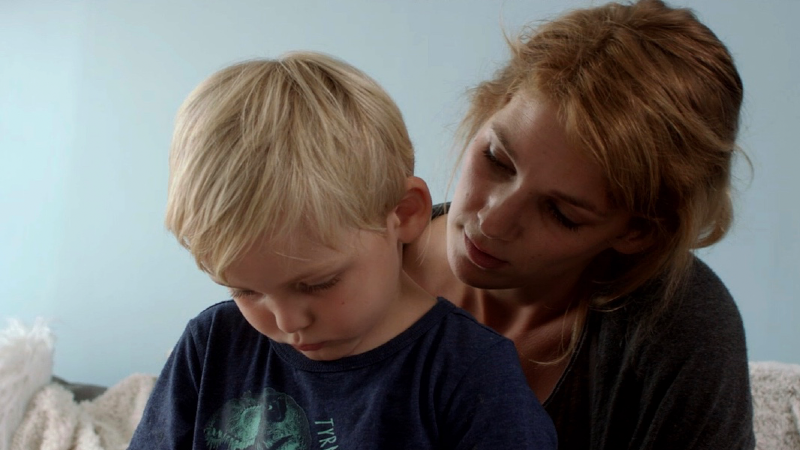




A happily married Parisian wife, the titular character of the drama, finds her life turned upside down when she discovers that her husband has emptied all of their accounts, they’re a year behind on their mortgage, and he has squandered all of her inheritance on prostitutes. Desperate to support herself and her son, Alice (Emilie Piponnier) begins working as a high-end escort.
When we allow someone to love us, we hand that person the power to irrevocably hurt us. Alice’s introduction portrays a seemingly picturesque life: apartment, husband, child and friends. But this is the proverbial calm before the storm, and when her perfect life is suddenly uprooted and she learns the truth, we feel her powerlessness, we feel her anger, we feel her sense of despair and hopelessness. She chose to trust her husband François (Martin Swabey) and she pays the price for it.
Director Josephine Mackerras and actress Piponnier, convey a dramatic moment with an emotional authenticity that reaches across the screen. We connect with Alice through an empathetic understanding, bonding with her through a shared vulnerability, a rooted fear of betrayal and dismissal. The actress’ skill is the delicate impression she first casts of Alice, who seems impervious to rage, but then her meekness gives way to anger, frustration and an ambivalent temper. Piponnier nurtures her character, but never loses touch of its delicate soul. The startling revelation feels genuine by the way she emotionally morphs, and throughout the drama, Mackerras and Piponnier sync Alice with the theme and idea of change – the Parisian housewife skin shed, yet whose aura remains unchanged.
The story is thematically centred around not only how one copes with adversity, but what one will do to survive. If the film successfully engages with the audience, it will provoke us to contemplate whether admiration for the strength to survive adversity supersedes social mores of acceptability? Mackerras offers us a litmus test, subtly asking, ‘How do you see Alice?’ When she first meets fellow high-end escort Lisa (Chloé Boreham), she’s told that the reason she’s chosen by the agency is, “It’s that good girl thing you have going.” As Alice sets on down this path, the question whether we see her is not framed by such extreme terms as either a moral condemnation or acquittal, but the nuanced question of whether we see her differently?

In one scene Alice says, “I don’t feel any different.” Lisa responds, “You mean now that you’re a fallen woman? If you’re in love, having sex may be the best experience of your life. If you are raped, maybe it’s the worst. But in our case, things are under our control, the exchange is fair. So why should you feel different?” Our experiences inevitably change us, but the film looks to whether we place too much emphasis on the idea of change, contemplating whether there is a core sense of self or identity that remains intact. If Alice does not feel any different from these new experiences, then should we see her as a different person? Alice challenges us to ask if our empathy is genuine, and whether we understand the complexities of identity, and do we apply that to how we engage with people outside of experiencing stories? Our response to this film may offer an insight into whether we are agents of humanity or slaves to judgement guided by naïve social mores, because as Alice says, “Prejudice is more powerful than logic.”
It often feels that we are living in an ignorant world, populated by cruelty and indifference. Mackerras’ Alice is a film aware of the black and white morality, because as the family lawyer, one of Alice’s first clients warns her, “When it comes to society’s morals and ethics, there will always be innocent victims.” It’s ironic in a world that is often missing its ethical spine that such distinctions should exist. Alice, who together with Lisa, offer a refreshingly mature and non-adversarial perspective that there are no victims, only players in a drama. Here we discover a humility, a momentary relief or escape from the hubris of our contemporary world.
At its heart, Alice is a story about empowerment, and it offers a thought about how one should live their lives that can resonate with all of us. Aside from the familiar notions of trust and love turning sour, the way in which the drama unfolds reminds us of the larger point that love is a privilege, it is not a right. Mackerras’ feature début is unassuming, mixing humour and anxious emotion with humanity and a little romanticism to good effect. Under her skilled direction it finds a way to be what it needs to be in any given moment, and effectively compromises the seriousness of drama with the lightness of comedy.
Alice is on Curzon Home Cinema, The BFI Player, Amazon Prime Video and Barbican Cinema On Demand from Friday, July 24th.
















